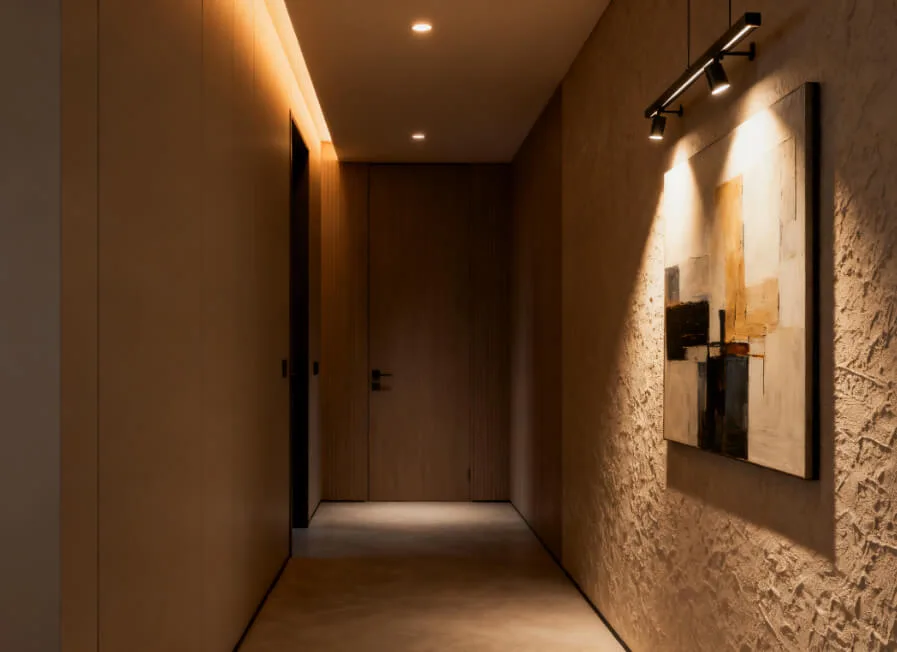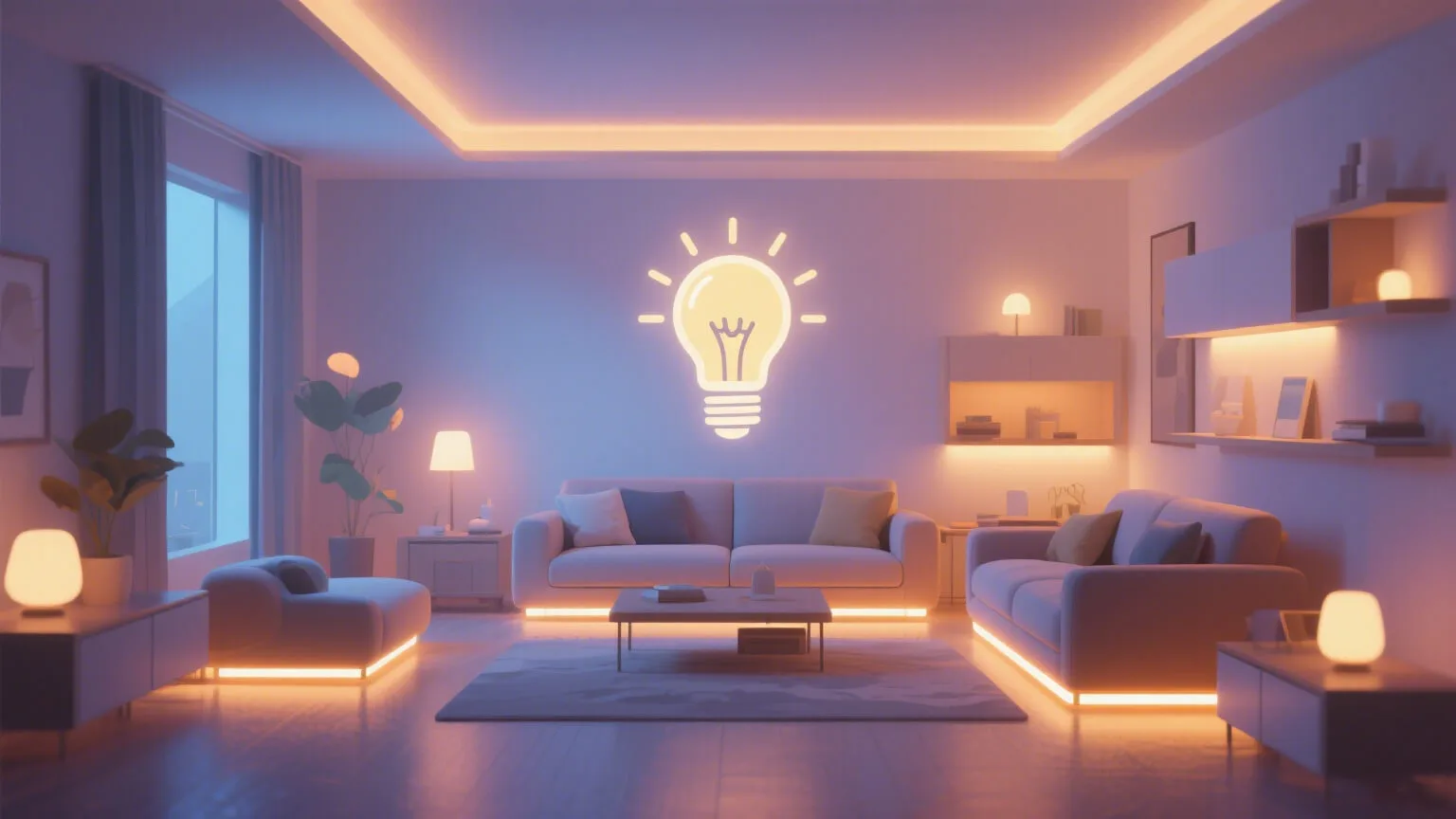I. Core Sizes and Corresponding Applications
The most common residential downlight cutout sizes are 2.5 inches, 3 inches, and 4 inches. In recent years, smaller sizes (e.g., 1.5 inches, 2 inches) and linear lights have also become highly popular in ceiling light design.
| Cutout Size (Inches) | Cutout Size (mm) | Recommended Wattage (LED) | Suitable Applications and Characteristics |
|---|---|---|---|
| 1.5″ – 2″ | 35 – 50 mm | 3-5W | Minimalist, modern lighting design. Ideal for: • Accent lighting: Under cabinets, wine racks, artwork, inside closets. • Supplementary lighting: Paired with linear lights to create a “starry sky” ceiling effect. • Compact spaces: Entryways, hallways requiring precise layout. Features: Compact, sleek, typically smaller beam angles, focused light spot. |
| 2.5″ | 64 mm | 5-7W | Mainstream size for modern lighting. Ideal for: • Residential spaces: General or wall-washing lighting in living rooms, bedrooms, studies. • Recessed spotlights: Many fixtures this size are spotlights, highlighting wall decor or objects. • Low-ceiling apartments: Compact size, avoids overwhelming the space. Features: Balances light output and size, a popular choice for contemporary homes. |
| 3″ | 76 mm | 7-9W | Versatile “golden size” for homes. Ideal for: • All rooms: General lighting in living rooms, bedrooms, kitchens, bathrooms, hallways. • Surface-mounted downlights: Often used in spaces without suspended ceilings; exterior size similar to 4-inch recessed lights. • Areas requiring even illumination. Features: Wider light spread, better light blending, reduces multiple shadows. |
| 4″ | 102 mm | 9-12W | Traditional mainstream size, suitable for residential and commercial use. Ideal for: • High-ceiling spaces (>3m): Villa living rooms, elevated balconies. • Areas needing ample general light: Kitchen countertops, overall bathroom lighting. • Commercial spaces: Offices, corridors. Features: High single-fixture brightness, broad coverage, but thicker housing requires adequate ceiling void depth. |
| 5″ – 6″ | 125 – 150 mm | 12-15W+ | Large-area general lighting. Ideal for: • Functional spaces with minimal aesthetic demands: Garages, basements, warehouses. • Industrial-style spaces with very high ceilings. Features: High presence, efficient light output, but less common in homes due to bulky appearance. |
II. How to Choose Based on Application? A Quick-Reference Table
| Space/Application | Recommended Size (Inches) | Layout Tips and Considerations |
|---|---|---|
| Living Room/Bedroom | 2.5″ – 3″ | General lighting: Even spacing (80-120cm), avoid direct placement above seating/beds. Wall washing: Place 20-40cm from wall, use spotlights (24°-36° beam angle) to highlight texture. |
| Kitchen | 3″ – 4″ | General lighting: Choose anti-glare downlights, evenly distributed to illuminate countertops, sink, and stove. Task lighting: Install 1.5″ – 2″ linear lights or small spotlights under cabinets for countertop illumination. |
| Bathroom | 2.5″ – 3″ | Must use damp-proof fixtures with IP44 rating or higher. Avoid installation directly above shower area; opt for dry zones or mirror areas (paired with mirror lights). |
| Hallway/Entryway | 2″ – 2.5″ | Compact spaces suit smaller sizes. Even distribution or use a spotlight at the end to highlight artwork for ambiance. |
| Study/Office | 3″ | Requires even, ample, glare-free ambient light. Choose deep-recessed anti-glare models to prevent reflection on screens/books. |
| Commercial/Showrooms | 2″ – 4″ | General lighting: 3″-4″. Product highlighting (e.g., clothing, jewelry): Use 2″-2.5″ spotlights with narrow beam angles for crisp light spots. |
III. Beyond Size: Other Key Factors
-
Wattage (W) and Luminous Flux (lm)
-
Wattage indicates energy consumption; luminous flux (lumens) measures brightness.
-
Generally, larger sizes can accommodate more LEDs, potentially offering higher brightness. However, total lumens should be selected based on room size and required illuminance.
-
Reference: Residential areas typically need 100-200 lumens per square meter. For example, a 10m² room requires 1000-2000 lumens total.
-
-
Beam Angle
-
Downlights (Beam Angle > 60°): Dispersed light for even general illumination.
-
Spotlights (Beam Angle < 60°): Concentrated light with defined spots for wall washing, artwork highlighting, or accenting objects.
-
Note: The same cutout size can be for downlights or spotlights—always check the beam angle when purchasing.
-
-
Color Temperature (K)
-
3000K: Warm yellow, cozy and relaxing—ideal for bedrooms, living rooms.
-
4000K: Neutral white, crisp and bright—suited for kitchens, studies, bathrooms.
-
5000K+: Cool white, focused and alert—best for offices, kitchen work zones.
-
-
Color Rendering Index (CRI/Ra)
-
Measures light’s ability to reveal true colors. Ra > 90 is the standard for high-quality residential lighting, offering vibrant colors. Ra > 95 is ideal for galleries, high-end retail.
-
Summary Recommendations
-
Modern residential lighting: Prioritize 2.5-inch and 3-inch sizes—current mainstream and versatile choices—supplemented with a few 2-inch spotlights for accents.
-
Traditional decor: 4-inch remains a reliable, widely applicable option.
-
Final decision: After narrowing down size, consider wattage (brightness), beam angle, color temperature, and CRI comprehensively. Consult lighting designers or test samples to achieve optimal results.



